Virginia and Georgia are two of the latest states to pass laws responding to the federal tax reform passed in December 2017, known as the Tax Cuts and Jobs Act (TCJA). Both states updated their codes to conform to the current Internal Revenue Code (IRC) with some notable exceptions.
Virginia
On February 22, 2018, and February 23, 2018, the Virginia General Assembly enacted Chapter 14 (SB 230) and Chapter 15 (HB 154) of the 2018 Session Virginia Acts of Assembly, respectively. Before this legislation was enacted, the Virginia Code conformed to the IRC in effect as of December 31, 2016. While the new legislation conforms the Virginia Code to the IRC effective as of February 9, 2018, there are some very notable exceptions. The legislation explicitly provides that the Virginia Code does not conform to most provisions of the TCJA with an exception for “any… provision of the [TCJA] that affects the computation of federal adjusted gross income of individuals or federal taxable income of corporations for taxable years beginning after December 31, 2016 and before January 1, 2018…” Thus, despite Virginia’s update of its IRC conformity date, Virginia largely decouples from the TCJA. (more…)
read more



 Subscribe
Subscribe





